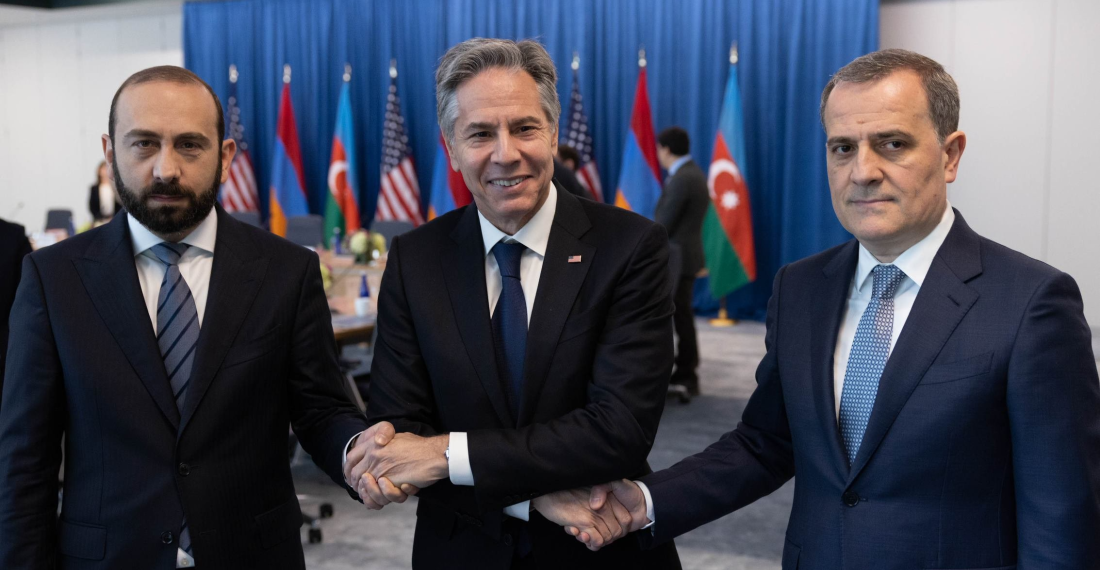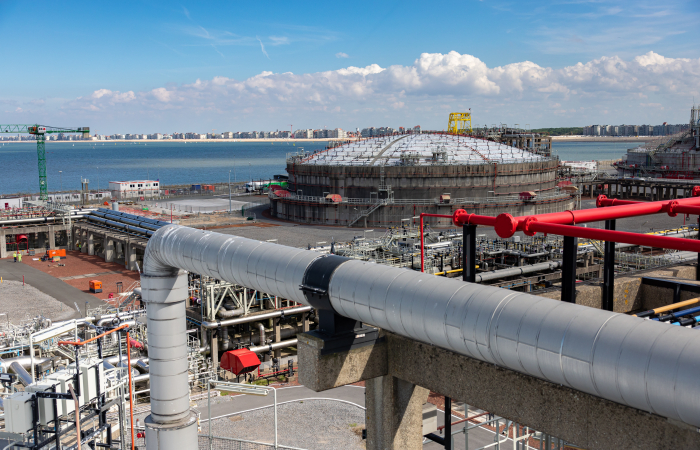The last month has probably been the single most active period in the long and complicated peace negotiation process between Azerbaijan and Armenia, writes Murad Muradov in this op-ed for commonspace.eu. The two countries' leaders have met three times, and a few significant developments have happened in between. So, depending on what we see in the coming weeks, May 2023 will go down in history either as a time of historic breakthrough or another big missed chance.
On 14 May, Aliyev and Pashinyan met for another round of EU-mediated negotiations, for the first time since the meeting scheduled for December 2022 was aborted after Armenia’s attempts to bring French President Macron to the table. Some statements made by Charles Michel, the chief mediator, demonstrated a further shift of the European position on the conflict towards the Azerbaijani one. Thus, speaking about the future integration of the Karabakh Armenians into Azerbaijan, Michel named them “this population”, without any reference to a special ethnoterritorial status, while also calling for European institutions “to participate in preparing a positive agenda in order to maintain their rights and security”.
This marked a significant change from Brussels’ previous position that called for establishing international mechanisms for preserving security of the Karabakh Armenians and which had been consistently opposed by Baku. Also for the first time, Michel explicitly stated the mutual recognition of the territorial integrity of Armenia and Azerbaijan at 29,800 km² and 86,600 km², respectively, leaving no room for maneuver. Previously, Baku had been always worried that while confirming Azerbaijani territorial integrity, Armenian officials would leave out Nagorno-Karabakh as “a special case”, referring to its “Declaration of Independence” of 1991 and its “reunification with Armenia” that happened in 1989.
Weeks later, despite certain incidents in the border area, the parties met within the framework of the Eurasian Union summit in Moscow. Russia was expecting a breakthrough to happen there, but it did not. Other than confirmation of Pashinyan’s commitment to open communications, no agreement was reached.
The multilateral meeting of the heads of states also featured a remarkable argument between Aliyev and Pashinyan, as the latter accused Azerbaijan of “illegally blocking the Lachin corridor” in the direct vicinity of the Russian peacekeepers who, according to him, should have prevented it. He also stated that “the Lachin road is the only corridor mentioned in the 9 November agreement”, and again spoke about “Azerbaijan’s territorial claims towards Armenia”. In his turn, Aliyev categorically denied Pashinyan’s claims, arguing that the word “corridor” should be normalized as it signifies transport routes (such as “North-South” or “Middle Corridor”) in general. Then, the trilateral meeting of Aliyev, Pashinyan and Putin lasted for just about 20 minutes.
There are serious grounds to believe that their unwillingness to conduct substantial talks in Moscow was mutual and may even have been agreed upon by Baku and Yerevan. It is no secret that the revitalisation of the Western mediation process has seriously annoyed the Kremlin, already desperate for a diplomatic success amid the bitter Ukraine campaign.
Armenia shifts towards the West while Baku's ties with Moscow grow cold
Pashinyan’s statements seemed to deliberately provoke Russia, though under a thin disguise. By pointing out Moscow’s unwillingness to “prevent the illegal blockade of the Lachin road”, he sent a signal that Armenia’s shift towards the West is the only viable choice left. On the Azerbaijani side, there is also increasing evidence that Baku’s ties with Moscow have been growing cold. On 21 May, Aliyev went to Lithuania, where he not only praised the development of the bilateral relations, but also spoke about the recent history of the Baltic countries as a blueprint of peaceful coexistence and partnership for the South Caucasus to replicate. 10 days later, at the European Community summit in Chisinau, Aliyev held a bilateral meeting with Ukraine’s President Volodymyr Zelenskyy where they spoke in English, which is a very sensitive issue for Moscow.
In Chisinau, Aliyev and Pashinyan met again, having negotiated in the presence of Charles Michel, President Macron and German Chancellor Scholz. The fact that Baku acquiesced to Macron’s participation and that the meeting took place amid new border incidents between the Moscow and Chisinau summits, has been largely interpreted as the parties’ willingness to achieve tangible outcomes soon. Significantly, Azerbaijani ambassador to France, Leyla Abdullayeva, in the aftermath of the Moscow meeting announced that a peace deal may be achieved in Chisinau. Moreover, Pashinyan took a very important step, agreeing to attend the inauguration ceremony of Turkish President Erdogan in Ankara, where he met with the leaders of the Armenian community and some representatives of the Turkish political elite.
Currently, it seems that peace between Azerbaijan and Armenia has never been closer. On 6 June, Azerbaijani MFA Bayramov made a statement that the countries are “at the doorstep of a peace treaty”. However, the lingering separatist regime in the Russian-controlled part of Karabakh remains a sore point that threatens reconciliation. On 23 May, Pashinyan explicitly stated that the official territory of Azerbaijan includes Nagorno-Karabakh. At the same time, he reiterated his commitment to establishing an international mechanism for the “dialogue between Baku and Stepanakert” (Khankendi), which Baku categorically rejects, insisting that it is a merely domestic issue. Moreover, despite multiple statements of the Armenian officials, financing of the separatist region from Yerevan goes on, and there are reports that arms continue to be moved there. Throughout May, the Azerbaijani Defense Ministry published a number of photos showing military installations in Karabakh, claiming that the “Artsakh army” continues to dig trenches and strengthen them with weapons.
Moscow may want another escalation since it would trigger calls in many Western governments to help Armenians and sanction Azerbaijan
For Baku, their presence is a constant threat. There are legitimate fears that the separatists might be used by the Russian peacekeepers to induce a new round of violence in order to again spoil peace negotiations, as Moscow may be desperate to preserve the status quo. Judging by such developments as the introduction of censorship by the separatist authorities and the decision of Moscow-linked oligarch Ruben Vardanyan to share $50 million from his private means with the intention to attract more resources from the diaspora, point to Russia’s interest in minimizing the regime’s ties with Yerevan and keeping it on life support. Moscow may be strongly interested in another escalation since it would trigger calls in many Western governments to help Armenians and sanction Azerbaijan. This may explain why the EU and U.S. have recently shifted their position, pressuring Yerevan into signing an agreement.
Hence, Azerbaijan would like Yerevan to use their leverage to encourage the separatist leaders to put down arms. Pashinyan has thus far been either unable or unwilling to influence the Karabakh Armenians, however; maybe he is afraid this will be too much for the Armenian society to swallow. Aliyev’s speech in Lachin on 28 May was quite telling, as he said that the separatist leaders may be subject to amnesty only if they voluntarily surrender. The mention of amnesty, by the way, was welcomed in the U.S., which just several months ago solidarised with Yerevan on demands for an international mechanism for protecting Karabakh Armenians. However, if the military activities in the so-called “Artsakh Republic” continue, Baku may find no other choice other than conducting an operation aimed to uproot the separatist military infrastructure.






